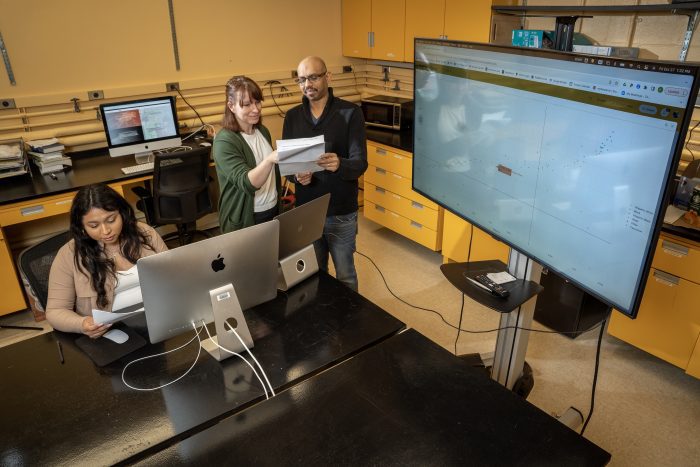SBU researchers study differences between brain and body age

By Daniel Dunaief
They can’t tell you whether the leading current presidential Republican and Democratic candidates demonstrate signs of cognitive decline or, for that matter whether any real or perceived cognitive decline is greater for one than the other.
Researchers at Stony Brook University, however, have conducted recent studies that may act as a platform to generate a measure of cognitive age that differs from chronological age.
Associate Professors Krishna Veeramah and Stacey Scott and graduate student Daisy Zavala recently published research in the Journal of Gerontology: Biological Sciences in which they studied a combination of cognitive testing done over different time periods and blood tests.
Indeed, the combination of looking at signs of epigenetic changes, or alterations in the environment that affect the way genes work, and studying the effectiveness and variability of tests of memory has the potential to offer some clues about how chronological age may differ from cognitive age. At this point, the scientists have been exploring that relationship, while future work may address not just what is happening, but also why.
Among the data from 142 subjects who took a host of learning tests from 2012 to 2016 during different time periods in the day, increasing epigenetic age was linked with poorer average processing speed and working memory, as well as with greater variability in test performance.
While the statistical analysis accounted for the fact that increasing chronological age had an effect, biological age had an even bigger impact, Veeramah, who is in the Department of Ecology and Evolution and a population geneticist at Stony Brook University, explained.
The study, which Veeramah described as an “early/pilot study,” and will require further follow up, offers another perspective on the different impacts the aging process can have on cognitive function.
The results matched the scientists’ prediction, which was that people who had greater epigenetic age acceleration processed information more slowly and had poorer memory performance on average across the study.
These individuals were not only performing more poorly on average, but were also more variable in their performance.
“This should give us pause about making judgments about people related to their age and what that means about their abilities,” said Scott, who is in the Psychology department.
This study suggests that “how old you are doesn’t tell you so much about how well you’re doing in your cognitive function,” said Scott. Theoretically, the extent to which a person’s body is older than a chronological age could be an indication of what might accelerate or decelerate cognitive function, although longitudinal studies will test this.
The researchers believe this study will contribute to a body of work that is trying to see if researchers can reliably identify biological age acceleration and, if so, how to slow it down.
Testing design
The researchers gathered data from participants who took tests on smartphones provided to them. These phones didn’t receive calls or messages and didn’t have access to the web.
Participants took tests during different times in the day. About 60 percent of study participants were African American and 20 percent were Hispanic/Latino. They also varied in household income, with most participants earning between $20,000 to $60,000.
In one test, people saw symbols at the top of the screen that they had to match with symbols at the bottom as quickly as possible. In another test, people viewed three red dots on a grid for a few seconds. They were distracted by searching for “E’s” and “F’s” on a screen and then had to place the dots back in their original place on the grid.
Participants completed dozens of tests over two weeks, offering a profile of their performance during different times of the day, situations and activities.
By testing people under various conditions, the researchers could get a more comprehensive, complete and realistic understanding of their cognitive state, which also reflects the way people experience a range of competing stimuli.
The scientists were profiling people “in terms of good and bad days” to get an understanding of their “typical performance,” explained Scott.
The SBU scientists suggested that inconsistency was increasingly proposed as a potential early indicator of dementia.
The “unique aspect” of what these scientists did is comparing epigenetic data to ambulatory cognitive measurements, rather than cognitive tests in a lab setting, Veeramah said.
To test the epigenome, Veeramah explored the degree of methylation of DNA from a single blood sample from each participant using a microarray to look at about a million positions in the human genome.
Adding a CH3 group, or methylating, genes tends to make the DNA coil more tightly, making it less likely to interact with other molecules that might turn it on.
Some parts of DNA show changes in methylation that correlate with age, while others are dependent on other things like the environment or specific cell type.
The underlying assumption is that cells pick up more damage and this includes the DNA sequence with time.
Zavala’s dissertation extends this work to look at more long term implications on cognitive health.
Zavala’s research “looks forward,” Scott explained in an email. “Does someone’s epigenetic age acceleration now at the beginning of the study predict their cognitive performance up to three years later?”
Dinner and a hypothesis
Veeramah and Scott, who got married in 2020, decided to combine their expertise for a research project.
“We were talking about our work over dinner and we thought about what I do and the kind of data we have from this existing sample of people” who participated in this cognitive study, said Scott.
The couple wrote a small grant to the research foundation at Stony Brook, which provided seed funding for this study.
Veeramah, whose research covers a broad scope of topics, suggested that the concept of studying these clocks is a fairly new area.
Researchers have been testing whether obesity, Alzheimer’s, and other factors could correlate with the internal environments that cause the kind of wear and tear often associated with aging.






